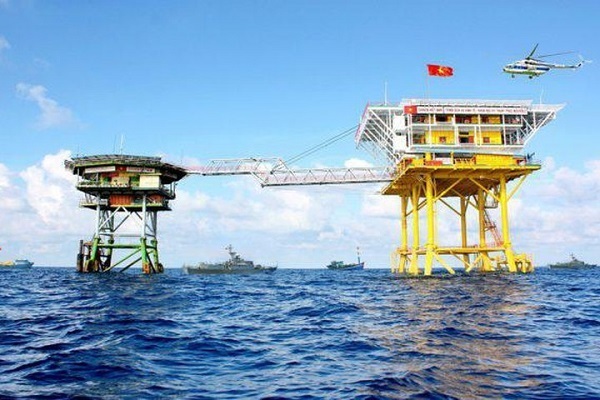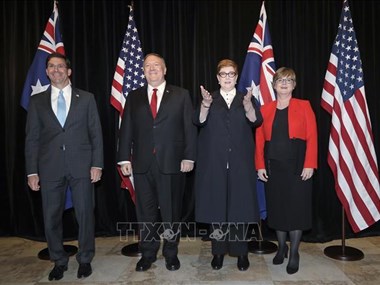1.The ‘cooperation for joint development’ trap
There is currently a large area in the East Sea (internationally known as the South China Sea) that China considers to be in dispute with other countries.

Armed conflicts in East Sea will be disastrous
First, this includes Hoang Sa (Paracel Islands) and Truong Sa (Spratly Islands), and Maclesfield Scaborough.
Second, the island of Natuna next to Indonesia, 800 nautical miles off southernmost Hainan Island, is also being eyed by China. They claim that this is the "traditional fishing ground" of Chinese fishermen.
Third, China's unreasonable "nine dash line" covering over 80 percent of the East Sea overlaps the claim on the exclusive economic zone and continental shelf of most countries in the East Sea, including Vietnam, Malaysia, Brunei and the Philippines.
| The armed conflict in the East Sea will be a disaster not only for Vietnam and China but also for the whole region and the world, says Vu Thanh Ca from the University of Natural Resources and the Enviornment. |
Realizing that it is impossible to obtain the recognition of other countries for its unreasonable sovereignty claims, China has proposed the initiative of ‘cooperating for joint development’ in the disputed maritime areas. The initiative, together with a series of others, aims at enhancing Chinese influence.
After taking office after the judgment of the Permanent Court of Arbitration (PCA), in 2016, Filipino President Duterte completely changed the approach towards China, with policies quite different from his predecessor who sued China.
He seemed to ignore PCA’s decision and upgraded relations with China. In addition, he made negative statements about the US, the closest ally. In exchange, he received big preferential loans from China.
With these moves, it seemed that the president could get very early cooperation with China in Filipino territorial waters.
However, the story is not so simple. The Constitution of the Philippines stipulates that national territorial integrity is inviolable, and therefore, the waters over which the Philippines has claimed sovereignty in compliance with international law, especially the United Nations Convention on the Law of the Sea (UNCLOS), has no overlap with China.
Thus, the cooperation with China can only be implemented if China accepts to be a hired employee and receives profit sharing.
The negotiations between China and the Philippines were kept in secret. However, in mid-2018, sources said the cooperation between China and the Philippines were facing insurmountable difficulties.
In late 2018, people were surprised when they saw Chinese President Xi Jinping visit the Philippines and signed a cooperation agreement with the country.
There are two very important things in the agreement. First, China and the Philippines will cooperate to carry out co-exploitation in the waters to be defined by the two parties. Second, the task forces of the two parties will work together to define the waters for cooperation within one year.
The time limit of one year raised questions. Obviously, if cooperating fairly and equally in the waters of the Philippines on the basis of recognizing the Philippines’ sovereignty, China will go against its claims.
Meanwhile, if cooperating with China on the disputed territorial waters, the Duterte cabinet may face the accusation of betraying the country.
The actions after the Chinese President’s visit seem to be completely different from ‘cooperation’. In late March and early April 2019, hundreds of Chinese militia ships flocked to Thitu Island which was being held by the Philippines.
The Chinese action sparked very negative reactions by the Philippines. The Filipino President declared that "national sovereignty is not negotiable", and the Filipino President in person stated that he would allow soldiers to carry out a suicide mission, while the country’s Ministry of Defense and armed forces claimed to be "ready to defend the territory".
2. The exclusive economic zone and continental shelf of Vietnam that China has violated this time, and legal issues.
In recent days, Haiyang Dizhi 8 violated the Vietnamese large waters of the exclusive economic zone and continental shelf in the southwest East Sea, which belongs to Vietnam in line with the UNCLOS 1982.
China argues that this area is within the "nine dash line" or part of the so-called "Spratly Islands waters".
However, the PCA’s 2016 judgment clearly states two points:
First, there is no legal basis for China to claim historic rights to resources in the waters inside the 9-dotted line.
Second, no structure in Spratly has the ability to create extended seas, and the Spratly Islands cannot jointly create maritime zones as a unified entity.
Thus, it is impossible to use the "nine dash line" or the "Spratly waters" to justify that the southeastern coast of Vietnam is a disputed area. It is purely an exclusive economic zone and a continental shelf of Vietnam.
On satellite imagery, Haiyang Dizhi 8 and Chinese escorts sometimes can be seen entering deep into Vietnam's exclusive economic zone, about 120 nautical miles from Vietnam's coast. As such, the Chinese ship has violated not only the continental shelf but also the exclusive economic zone of Vietnam.
Under international laws, especially the UNCLOS, coastal states have national sovereignty and jurisdiction rights over exclusive economic zones.
Sovereignty rights include the privilege of exploring, exploiting, managing and conserving resources on the sea surface, the waters above the seabed and in the seabed, and other activities for exploring and exploiting natural resources for economic purposes.
The jurisdiction rights of coastal states include the rights to allow other countries to explore, exploit and use resources, carry out scientific research, and install underground cables and works and equipment in the areas.
The UNCLOS also stipulates that other countries, when carrying out activities in the exclusive economic zone and continental shelf, must comply with the laws of coastal states if the laws are not contrary to international laws.
Vietnam has fulfilled all necessary procedures to implement the rights of the coastal state in accordance with international laws, including the Declaration of the Government of the Socialist Republic of Vietnam on the baseline used to calculate the width of Vietnam territorial waters in 1982; and the Profile of the outer boundary of the continental shelf submitted to the United Nations in 2009. It enacted the Vietnam Law on the Sea in 2012 and the Law on Resources, Marine Environment and Islands in 2015.
In the above-mentioned legal documents as well as the documents guiding the implementation of the laws, Vietnam clearly defines Vietnam's exclusive economic zone and continental shelf, as well as detailing the rights and obligations of other countries when carrying out activities in the exclusive economic zone and continental shelf of Vietnam.
3.The corollaries of Chinese actions to the region, safety, freedom of navigation, aviation and international law maintenance in East Sea
China's actions in recent days in the exclusive economic zone and the continental shelf of Vietnam as well as previous actions with the Philippines are extremely dangerous acts, which are contrary to the provisions of international law and perceptions and agreements of senior leaders of ASEAN countries, especially Vietnam, the Philippines and China.
China's actions can also be seen as actions of provoking, complicating the situation, escalating conflicts, and affecting peace and stability in the East Sea.
The actions are particularly dangerous in the context of ASEAN countries and China negotiating the Code of Conduct in the East Sea (COC), an extremely important tool to help maintain peace, stability, freedom of navigation, aviation and sustainable development of the East Sea.
With its illegal activities, China must take major responsibility if COC negotiations are prolonged or unsuccessful.
4.The solutions for Vietnam when China violates Vietnam’s special economic zone and continental shelf
For many years, with the policy of protecting national sovereignty and national interests by peaceful means, on the basis of international law, Vietnam has always complied with international laws. It has made every effort to reconcile before taking stronger solutions to protect sovereignty.
Vietnam knows that China's provoking activities in the East Sea will cause great damage to the relations between the two countries and for China itself. Therefore, even when China carries out provoking activities in the East Sea, Vietnam still tries to minimize damages to both sides.
In order to prepare forces to deal with urgent situations, in addition to political and diplomatic solutions, Vietnam has focused on strengthening the power of the civilian law enforcement system at sea, such as the marine police.
Vietnam this time has strictly complied with the provisions of international laws. It has reacted very quickly and strongly in the field, and used political and diplomatic solutions. It also sent a diplomatic note to protest against the violation.
If China continues to violate Vietnam, Vietnam needs to take tougher solutions. The former Prime Minister Nguyen Tan Dung once said that Vietnam is preparing documents and is ready to take legal measures, including suing Chinese countervailing actions in an appropriate international court.
Vu Thanh Ca

Australia, US, Japan concerned about Chinese behaviour in East Sea
The foreign ministers of Australia, the US and Japan have expressed their "serious concern" over "credible reports of disruptive activities in relation to longstanding oil and gas projects" in the East Sea.

East Sea issue attracts great attention at AMM-52: official
The East Sea issue has attracted great attention from the countries participating in the 52nd ASEAN Foreign Ministers’ Meeting (AMM-52) and related meetings, given the recent developments in the waters
 The armed conflict in the East Sea will be a disaster not only for Vietnam and China but also for the whole region and the world, says Vu Thanh Ca from the University of Natural Resources and the Enviornment.
The armed conflict in the East Sea will be a disaster not only for Vietnam and China but also for the whole region and the world, says Vu Thanh Ca from the University of Natural Resources and the Enviornment.